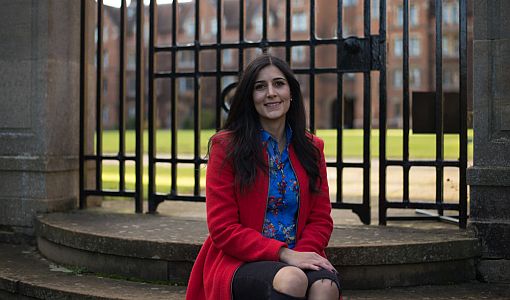For some time now the JCR has been running a ‘Students of Selwyn’ series, profiling some of the undergraduates at the college. We’re delighted that the MCR is now working to expand the series, so that in future it will include graduate students too.
The first representative of our MCR is Hiba Salem, who talks about her journey from Syria to Selwyn - and her research among refugee communities.
Q: Where are you from? Where did you study before coming to Cambridge?
A: I am from another ancient city, Damascus. I studied and lived in Syria until I was accepted by Cambridge in 2014 for an MPhil. I am now in the third year of my PhD.
Q: What motivated you to pursue postgraduate study at Cambridge?
A: I was living in Damascus during the first three years of the war. Our lives were transformed beyond recognition within mere months. Our home changed so violently and so rapidly. One day, I saw the phrase “a lost generation”, a term used to characterise the millions of Syrian children who would grow up with very little or no education whatsoever. It was devastating to know that this would be written into Syria’s future. While I always wanted to study for a postgraduate degree in Education, it was during those years that I became certain of what it is I wanted to work on.
Q: In a few words (although there will soon be 80,000 of them) can you describe your research project? Is there anything in particular about your work that you'd like to share with a wider audience, especially prospective students to Cambridge?
A: I research the well-being of Syrian refugee students in Jordan using innovative visual methods to engage their own interpretations of their schools. The impetus behind my research stems from the high dropout rates of refugee students in Jordanian schools. Last year, I interviewed 80 refugee students across secondary schools in Jordan to discuss the students’ reflections on their lives. Specifically, my research works to understand how the students’ educational experiences in Jordan, such as being segregated from their Jordanian peers, impact their sense of well-being, feelings about the future, and their own perceived likelihood of dropping out of school.

Q: What do you think is the potential broader impact of your research project? Are there things that you'd like to do in the future that build upon your PhD in education?
A: One of the most challenging issues faced today is the staggering number of refugees across the globe. Experiences of refugees are often underrepresented despite decisions being made on their behalf daily. When decision-makers speak of the struggle to provide refugees with quality education, we ultimately know very little about their experiences and what we can do to improve their well-being. I hope that my research shows the importance of individual voices and contexts. I hope that my future research will encourage the inclusion of the voices of refugee students in assessment and policy-making processes.
Q: How has being at Selwyn influenced your experience of Cambridge? Do you think that the College, or in the MCR, have contributed anything unique to your experience of Cambridge?
A: Selwyn has a fantastic community spirit and is one of my favourite things about Cambridge. It is an incredibly colourful community made up of so many interesting and genuine people from all over the world. Being away from home has been made easier by the friends I have made through the MCR. Oh, and dinner parties.
Q: Anything else you'd like us to know about you?
A: I really like this whole English tea & cake in the afternoon thing.
Keep in touch with all our Students of Selwyn on our Facebook page: https://www.facebook.com/Selwyn.College.Cambridge/


